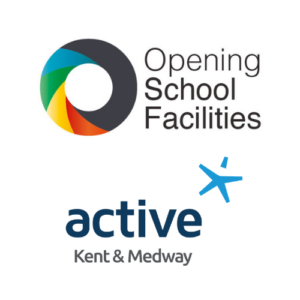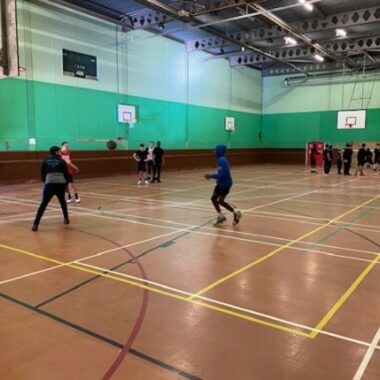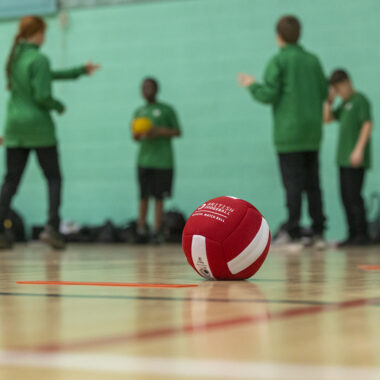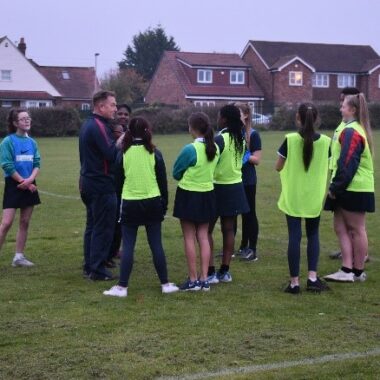Opening School Facilities 2023-24 Report
Introduction
 Opening School Facilities (OSF) is a Department for Education school funding programme used to help meet the goals of the Government’s School Sport and Activity Action Plan. The aim of the programme is to help schools open their existing sport facilities for a broader range of young people and to support the wider community by partnering with sporting organisations, who can help deliver activities in these settings.
Opening School Facilities (OSF) is a Department for Education school funding programme used to help meet the goals of the Government’s School Sport and Activity Action Plan. The aim of the programme is to help schools open their existing sport facilities for a broader range of young people and to support the wider community by partnering with sporting organisations, who can help deliver activities in these settings.
Active Kent & Medway is proud to support the OSF programme and by working with schools and local activity providers we continue to:
- Enable them to deliver new or enhanced activities to increase the range of face-to-face opportunities for young people and their families.
- Ensure schools are aware of further opportunities to open their sports facilities sustainably beyond the end of the programme.
Find out which schools across Kent and Medway support OSF and have opened up their facilities
Headlines
32
Schools involved
9,259
Participants (School and Community)
753
Sessions delivered
Community Activities
Schools have opened up their facilities to the community. It has been an opportunity for schools and local community groups and clubs to connect and work together to offer more opportunities for local communities to get active.
Community activities have included:

Engage Sports Club at John Wallis Academy – supporting disabled young people in the community to be active in a safe, inclusive environment.
School Games Events - giving young people an opportunity to take part in sport that they may not have the opportunity to try outside of school.
Gymnastics at Marsh Academy – developing a financially sustainable Gymnastics club.
Family Fun Days – welcoming parents and children to participate together.
Year 6 Transition Sessions – easing the transition from primary to secondary school.
Climbing Experiences - opening up opportunities to primary schools who do not have such facilities.
“I’m feeling active and fit, more social, have made new friends and feeling good about myself.” Participant, Marsh Academy.
Community Activities Impact
Parents and participants who attended community clubs and activities said the sessions improved their socialisation skills, gave them the confidence to join other activities, develop new friendships and gave them a new hobby to enjoy.
Community participants said the activities...
Helped them build new friendships
Increased their enjoyment in being active
Enabled them to do more activity than they did before
“The use of the facility for us has been amazing. Without the use of this facility the children of our local community would not of been able to have the many experiences (games, training, tournaments) that we were able to achieve this year.” Loose Netball Club
Community Activities Stories
The Engage Club
Julie has a daughter with Down Syndrome. There were no inclusive sport sessions in her area so she helped set up The Engage Club to support children with a disability to be active. Activity sessions are fun, inclusive and driven by the needs of the children. Sixth formers from John Wallis Academy have been upskilled to help support session delivery which the children love. Julie says her daughter looks forward to the sessions every week, she gets to socialise with children like her and try new activities.
Community Activities Challenges

Out of date equipment
Loss of facilities during exams
Keeping on top of payments
Staffing to cover evening and weekend shifts
Co-ordinating bookings
Advertisement
Community Activities Learning
1. Work with your community
Get to know your local community to find out what their needs are, the space they require and any support you can provide. Working with local organisations can bring together knowledge, skills and resources to create new opportunities.
2. Have clear safeguarding agreements in place
Have clear safeguarding agreements between schools and community organisations which outline the policies that are in place. This ensures parties are aware of their responsibilities and distinction between school club and community clubs.
3. Efficient booking systems
Think about the booking system you use. It’s got to be easy and simple to use for both the school and clubs. Locally, schools have been using School 4 Hire which has proven to be easy and efficient.
“The club is a much needed provision. It is providing an outlet for students who might find it difficult to attend clubs with others. It gives a safe, welcoming environment that doesn’t provide pressure to participate. It’s also a social hub for those that attend and parents with children with similar challenges to support each other and provide a network that opens up friendships. It is a club that the children are proud of and it gives them a sense of affiliation and ownership.” Deliverer, Engage Club – John Wallis Academy
School Clubs
The programme has enabled schools to put on new and additional activities, upgrade or buy new equipment, fund staff and student training or pay for external instructors. Schools have focused on targeting smaller, specific groups of disengaged students embedding student voice within projects to gather thoughts and ideas to inform delivery. Our student survey showed 75% of students said that being asked ‘how the sessions are run’ led to them taking part more often.
Find out about the importance of Youth Voice and how it can support your activity delivery
School Clubs have included:

Self Defence
Archery Tag
Dodgeball
Climbing
SEND Multi-sports
Yoga/Mindfulness
“We have engaged students who before were not engaged with extra-curricular. Giving them chance to socialise and be active where normally they wouldn’t.” St John’s Catholic Comprehensive School
School Clubs Impact
Schools reported the programme allowed them to access high quality coaching, provide leadership opportunities, a pathway into competitive sport and engagement from wider school staff.
Schools said the programme helped them to...
Offer more opportunities to be active
Upskill people in their organisation
Develop new relationships with organisations
“We have worked and developed a closer relationship with local primary schools. This has allowed us to work with students we will have at the school in the future.” Hartsdown Academy
School Clubs Challenges

Maintaining attendance
Loss of facilities during exams
Safeguarding and provision concerns
Staffing of after-school clubs
Programme administration
Targeting the least active
School Clubs Learning
1. Upskill members of the school community to deliver.
Identify staff and students that could become part of your school workforce. Find out their skills, develop their confidence all whilst helping with project sustainability and providing them with additional and transferable skills.
2. Consistent Club offering.
Students like familiarity. Ensure reliable delivery using the same deliverer, on the same day and time. This helps build trust and can increase attendance, behaviour and engagement.
3. Use coaches with school-to-community links.
To develop exit routes for students to continue to develop their skills, work with organisations who can link them to local clubs in the area. It can raise the club profile whilst offering schools a chance to showcase their facilities.
Student Impact
Using the school clubs to target disengaged students has provided a support network for students, built up confidence to attend more clubs, offered competitive opportunities for those who have never competed and created a pathway for them to be active.
Students said the clubs...
Increased their enjoyment in being active
Increased their confidence to be more active
Helped them build new friendships
“My friends were doing it, it helped me enjoy it and feel more motivated to go.” Student
We asked students about their activity levels before and after attending the school clubs.
0-29 minutes per day
30-59 minutes per day
60 minutes per day
Student Stories
Names have been changed for privacy purposes.
Hannah’s Netball Story
 Hannah used to play netball at primary school, but since starting secondary school stopped playing and being as active. She heard from a friend that a netball club was starting up so decided to join as she used to really enjoy it. Since joining the club Hannah is now more active, built new friendships and increased her confidence and enjoyment in being active. Hannah likes that she gets to choose the position she’s comfortable with and make decisions around warm ups and skills she wants to develop.
Hannah used to play netball at primary school, but since starting secondary school stopped playing and being as active. She heard from a friend that a netball club was starting up so decided to join as she used to really enjoy it. Since joining the club Hannah is now more active, built new friendships and increased her confidence and enjoyment in being active. Hannah likes that she gets to choose the position she’s comfortable with and make decisions around warm ups and skills she wants to develop.
Tom’s Fitness Story
 Tom wanted to try something new and improve his fitness, he heard about a new gym club on the schools teams page and decided to join with his friends. At the beginning of the sessions the teacher asks them what they want to work on and adapts to suit individual needs using different training methods and equipment. Tom says the gym has helped him manage his physical health, gain new friends and try new activities.
Tom wanted to try something new and improve his fitness, he heard about a new gym club on the schools teams page and decided to join with his friends. At the beginning of the sessions the teacher asks them what they want to work on and adapts to suit individual needs using different training methods and equipment. Tom says the gym has helped him manage his physical health, gain new friends and try new activities.
Next Steps
The Opening School Facilities programme will continue to support schools in areas of greatest need, to provide positive experiences for students who are least likely to be active and open to the wider community.
Schools signed up to the programme will focus on:
- Delivering at least three clubs with sports collectively chosen by their least active students.
- Hosting at least two community projects delivered for members of the community at free or low cost.
- Thinking about sustainability by identifying sixth form students and school staff to become qualified to support the delivery of after school clubs and community sessions.
Active Kent & Medway will:
- Continue to share the findings from consultation with young people to ensure their voices are heard and activities are targeted at those least likely to be active.
- Forge partnerships between schools, newly qualified sixth form students and community organisations to continue to deliver activities all young people can benefit from.
- Share the learning with all schools relating to how those who are signed up to the programme have provided positive opportunities for their students and the local community.
If you have any questions about the Opening School Facilities programme or the findings in this report, please contact Daniel Bromley, Children and Young People Development Officer at daniel.bromley@kent.gov.uk.

